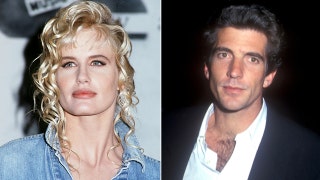Prosecutors trying the case against Michael Jackson's doctor on Thursday called a leading expert on the anesthetic propofol Thursday to begin telling jurors about the drug and its acceptable uses.
Prosecutors and several experts who have already testified contend that Dr. Conrad Murray's use of propofol to help Jackson sleep was a dangerous and reckless decision that cost Jackson his life.
Dr. Steven Shafer was expected to be the final prosecution witness in the case against Murray.
The trial was recessed for the day due to a scheduling issue and will resume Monday. Prosecutors were expected to rest their case next week after Shafer's testimony concludes.
Shafer helped craft guidelines for appropriate propofol dosing for sedation that is included in the packaging of every bottle that is sold.
Murray told police he was using the anesthetic to help Jackson sleep, which other doctors have testified was a gross deviation from the standard of care.
Defense attorneys were expected to rely on a colleague of Shafer to offer a counter-argument.
Authorities say Murray gave Jackson a fatal dose of propofol. Murray has pleaded not guilty to involuntary manslaughter.
Testimony began Thursday with Dr. Nader Kamanger, a UCLA sleep expert, being cross-examined by defense attorney J. Michael Flanagan about Jackson's insomnia.
Kamanger reiterated for jurors his view that Murray failed Jackson in multiple ways, including not calling 911 in a timely manner, not keeping medical records and not attempting to diagnose the reason why the singer couldn't sleep.
The defense case shifted Wednesday when an attorney for Dr. Conrad Murray revealed he was abandoning the theory that Jackson swallowed the fatal dose of the anesthetic propofol.
Previously, Murray's attorneys repeatedly told jurors they will show Jackson self-administered either the anesthetic or the sedative lorazepam without Murray's knowledge. They had invested months before the trial on the theory that Jackson somehow drank propofol and caused his own death.
Flanagan stunned a judge and prosecutors by saying the results of a study he commissioned confirmed that if Jackson swallowed the anesthetic, its effects would be "trivial." He said the issue wouldn't be raised with jurors.
Murray's attorneys may still argue that Jackson gave himself the fatal dose of the drugs, but a pair of experts told jurors that even if that happened, it didn't change that Murray went far astray from medical norms.
The experts, a cardiologist and Kamanger, who both practice emergency medicine, said Murray should have never been giving Jackson propofol as a sleep aid.
He also noted that Murray left the singer alone in his bedroom on June 25, 2009, with a variety of drugs readily available.
Jackson's death, he said, was "a foreseeable complication."
Murray could face up to four years behind bars and the loss of his medical license if convicted.















































